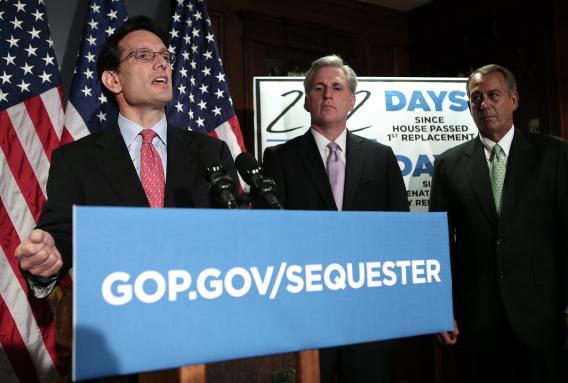A lot of liberals I read are very hot to trot with the idea that Congress should just repeal sequestration tout court. That’s definitely correct as a matter of basic Keynesian countercyclical stabilization policy and obviously it makes for a nice convergence point for people who want to keep the fiscal stimulus agenda in the discourse.
But on the merits it seems to me that while sequestration is hardly optimal budget policy, it really isn’t all that bad in the scheme of things, and really going through with it would be better than repealing it. The key reason is that fully half the cuts are cuts to “defense” spending, and yet nobody from either party is seriously trying to maintain that America will be left defenseless in the wake of this reduced military spending. The specific sequestration mechanism is clearly awkward and clumsy, but again nobody’s saying the Mexican army is going to come swarming over the border to reconquer Santa Fe, that the Taliban is now going to be able to outspend the Pentagon, or that America’s NATO allies are now left unable to fend off a Russian invasion. That’s half the cuts with basically zero real public policy harm.
So then you look at the domestic side. Your basic transfer payments to poor people are spared, your transfer payments to the elderly are basically spared, and then everything else gets cut willy-nilly. That leads to some real policy harms. Valuable research grants are going to not happen. We’ll see some real bottlenecks at regulatory agencies. But obviously there’s some waste and fat in this domestic discretionary spending.
Long story short, if you’re a defense dove like me and have a nonutopian view of the domestic discretionary budget, then this looks like we’re mostly talking about harmless spending cuts. It is very true that the current moment is not an optimal time to cut wasteful government spending. Given the high unemployment rate, the low and stable inflation rate, the low cost of federal borrowing, and the weird dynamics of “Evans Rule” monetary policy, I would say that 2013 is an excellent time for the federal government to waste some money on make-work military contracting gigs. But in the grand scheme of things, wasting resources on low-value programs is not a great idea, and there’s more to life than timing.
Sequestration, long story short, is not a great idea, and there are a lot of alternatives that I would deem superior, but it very much seems to me that doing it would be better policy than straightforwardly undoing it. The spin war on this has gotten a little bit odd. Initially, my logic was exactly why Democrats thought they had leverage in this situation. Sequestration is cuts liberals can live with but conservatives can’t, which should bring conservatives to the table to discuss a more balanced approach even though conservatives are more favorably disposed to cuts in the abstract. But Democrats seem reluctant to actually articulate the point that most defense spending is useless from the standpoint of national defense, so they’ve pivoted their spin to the idea that the sequester cuts will cause the public such intolerable pain as to force the GOP back to the table. The original spin, however, strikes me as much more plausible than the new spin.
